Choosing the right yoga mat for Pilates isn’t just about looks. It impacts your practice quality. It affects client satisfaction. It even prevents injuries. For studios, gyms, and retailers in the USA, I recommend investing in high-quality wholesale yoga mats. This investment protects your business reputation. It also improves customer retention.
The U.S. market offers numerous wholesale options. But quality varies. This guide focuses on helping you identify yoga mat suppliers who understand Pilates-specific requirements. Generic yoga mat distributors won’t cut it.
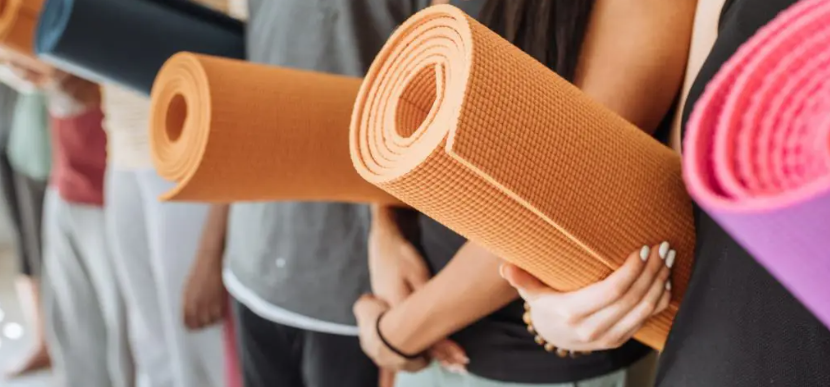
I recommend yoga mat manufacturers who prioritize eco-friendly materials. They maintain consistent quality control. They offer transparent pricing. They provide responsive customer service. You might be a boutique Pilates studio in Los Angeles. You might run a chain gym operation. You might be an online wellness retailer. The right wholesale partnership transforms your mat purchasing. It changes from a recurring headache into a competitive advantage.
Key Features To Look For In A Pilates Yoga Mat
Choosing the right Pilates yoga mat means knowing what technical features matter. Not all yoga mats work well for Pilates. The demands differ. I’ll break down the critical specs that matter most for wholesale buying.
Thickness & Density: Finding the Sweet Spot for Joint Protection
The ideal thickness for Pilates mats is 6mm to 10mm. This range isn’t random. It reflects what Pilates practice needs.
Thinner mats (3-4mm) work for traditional yoga. But they fail in Pilates. Your clients spend long periods on knees and elbows. Rolling exercises put direct pressure on the spine. Poor cushioning causes discomfort. It distracts from proper form. Clients cut their sessions short.
Thicker mats (above 10mm) create different problems. They hurt stability. Balance exercises become harder. Standing movements feel unstable. The mat surface shifts too much during transitions.
Density matters as much as thickness. High-density foam keeps its structure under repeated pressure. Low-density materials compress and stay compressed. They create uneven surfaces. Within months, high-traffic areas flatten. Your investment loses value fast.
When buying wholesale, I recommend testing density by:
– Pressing hard with your thumb
– Checking for quick rebound
– Examining compression recovery time
– Checking uniform density across the entire mat surface
Premium wholesale Pilates mats keep their cushioning through thousands of uses. This durability justifies the higher initial cost.
Grip & Texture: Non-Slip Performance for Dynamic Movement
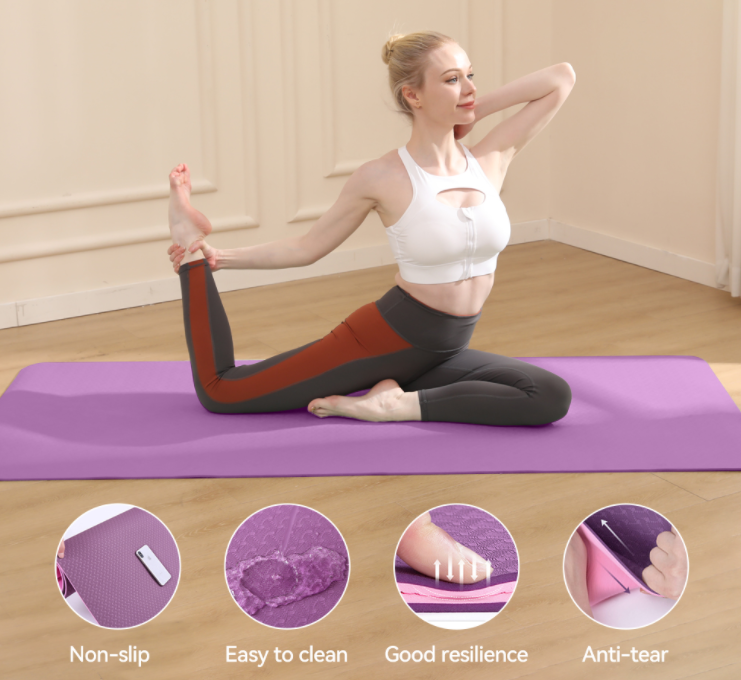
Grip determines safety in Pilates practice. Dynamic movements require secure hand and foot placement. Side-lying leg work depends on it. Plank variations demand it. Controlled transitions need reliable traction.
Pilates differs from static yoga poses. Movements flow without stopping. Practitioners shift weight all the time. A mat that works for holding poses might slide during Pilates sequences.
Surface texture affects grip performance. Several options exist:
-
Raised textures: Create friction through physical patterns. They work well when dry. Performance drops when mats get sweaty.
-
Micro-textured surfaces: Provide consistent grip in various conditions. They handle moisture better than smooth surfaces.
-
Natural rubber patterns: Offer excellent traction. Some users have latex sensitivities.
-
Dual-layer designs: Combine different textures on top and bottom surfaces. The bottom grips the floor. The top provides skin contact traction.
For wholesale buying, I suggest testing grip in real conditions. Place the mat on your studio floor. Try plank-to-downward-dog transitions. Attempt side planks. Test heel slides. The mat shouldn’t shift or bunch.
Bottom surface grip matters just as much. Pilates involves full-body movement across the mat. The mat must stay anchored to the floor. Check that the bottom texture prevents sliding on:
– Hardwood floors
– Vinyl surfaces
– Rubber gym flooring
– Carpet (if you have it in your facility)
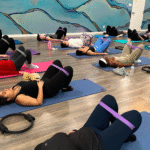
Related Reading: Best Pilates Yoga Mats For Wholesale Studios And Gyms
Top Wholesale Yoga Mat Manufacturers & Suppliers In The USA
Finding reliable yoga mat wholesale suppliers separates profitable mat purchases from constant headaches. I’ve researched the U.S. market to find manufacturers and suppliers who understand Pilates needs. Each has different strengths for various business models.
FDM Yoga – Global Manufacturing With Custom Branding & OEM/ODM Support
FDM Yoga represents the manufacturing approach rather than brand-focused purchasing. They offer full OEM/ODM services for U.S. buyers seeking customization.
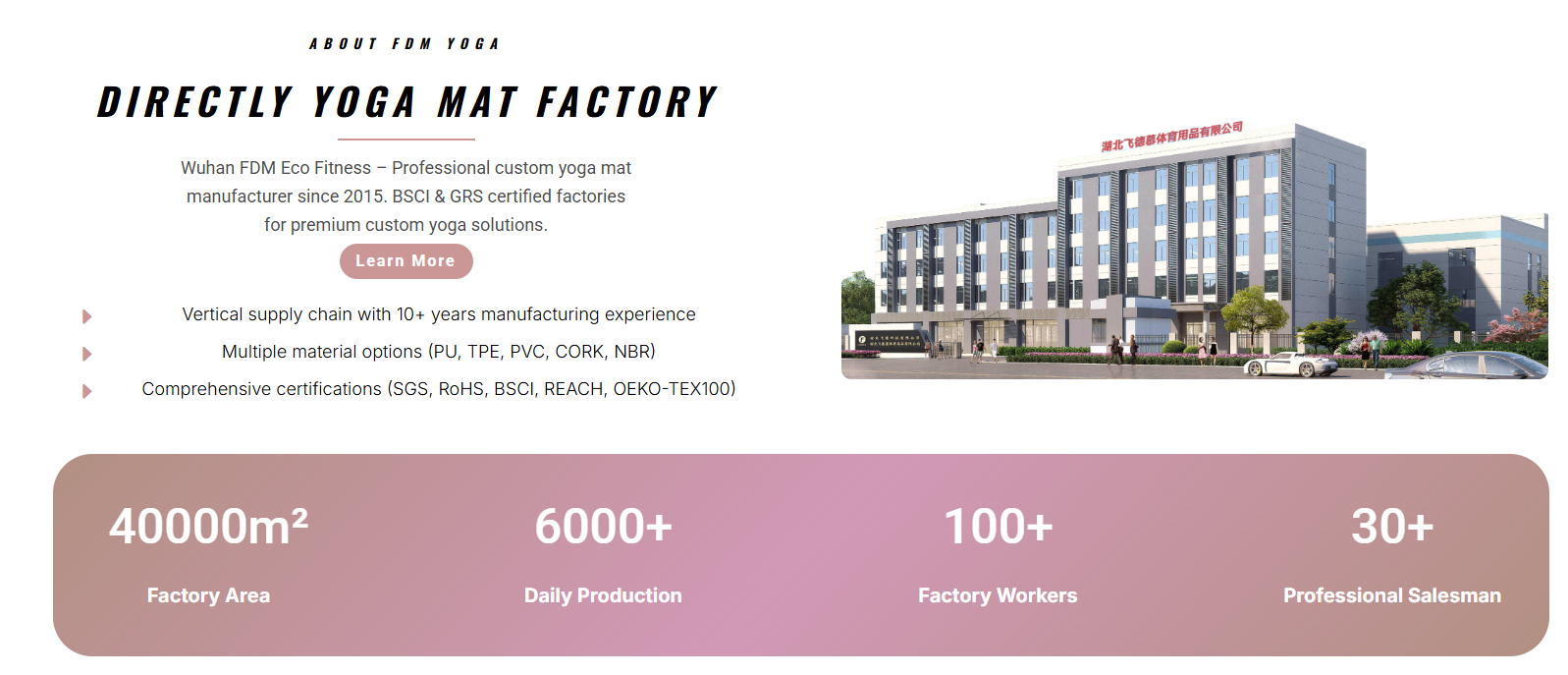
Manufacturing capabilities:
-
Full customization: Design mats matching exact specs—thickness, materials, dimensions, colors
-
Private labeling: Add your studio logo, brand colors, and unique designs
-
Material flexibility: Choose from TPE, PU, natural rubber, cork, or combination builds
-
Prototype development: Test samples before committing to production runs
-
Quality certifications: OEKO-TEX, REACH, and other international standards
Wholesale pricing advantages:
FDM’s direct manufacturing model delivers major cost savings. Wholesale prices range $8-25 per mat based on specs and order volume. Minimum orders start at 100-500 units.
The cost difference becomes big at scale. A 200-mat order might cost $3,000-5,000 versus $7,000-10,000 from premium U.S. brands. For multi-location operations, the savings grow fast.
Ideal for:
Studio chains: Standardize custom-branded mats across multiple locations
Retailers: Develop private-label mat lines with unique positioning
Large fitness facilities: Outfit entire gyms with branded equipment
Franchise operations: Create consistent branded experience systemwide
Wholesale distributors: Source products for resale with margin flexibility
Process considerations:
Working with manufacturing suppliers needs a different approach than U.S. brand purchasing:
-
Lead times: Production and shipping take 6-12 weeks versus 1-2 weeks for domestic suppliers
-
Communication: Time zone differences and language gaps require patience
-
Quality verification: Request pre-production samples and establish clear specs
-
Shipping logistics: Understand customs, duties, and freight forwarding processes
-
Minimum commitments: Higher unit minimums require storage capacity and capital
I recommend FDM’s approach for established businesses ready to scale. New studios should gain operational experience before committing to large manufacturing orders.
Gaiam – Studio-Grade Durability From An Established U.S. Brand
Gaiam has served the American wellness market for over 30 years. Their wholesale program works well for studios and retailers.
Key strengths for bulk buyers:
Studio-grade construction: Their Premium line uses high-density materials that hold up through heavy commercial use
Consistent quality control: Batch-to-batch changes stay minimal, which matters when replacing mats over time
Wide thickness range: Options from 5mm to 8mm suit different Pilates uses
Established distribution: Quick fulfillment across the continental U.S. cuts down inventory gaps
Brand recognition: Clients know the name. This adds value to your facility.
Wholesale pricing:
Gaiam’s wholesale prices range from $15-35 per mat based on what you order. Minimum orders start around 20-50 units. You get volume discounts at 100+ units.
Best suited for:
Mid-range studios seeking reliable American brand recognition. Facilities that want predictable reorder processes. Retailers needing brands that sell themselves.
Potential limitations:
-
Limited customization options compared to OEM suppliers
-
Premium lines cost more than import alternatives
-
Standard color options may not match unique branding needs
B Yoga – Natural Rubber Excellence With Sustainability Focus
B Yoga sits at the crossroads of performance and environmental care. Their wholesale program focuses on natural materials.

Key wholesale advantages:
-
Natural rubber composition: 99% natural rubber gives superior grip and durability
-
Eco-certification: OEKO-TEX certified materials appeal to eco-conscious clients
-
Density edge: Their 4mm mats cushion as well as competitors’ 6mm products due to compression resistance
-
Moisture management: Surface technology improves grip when mats get sweaty
-
U.S.-based customer service: Direct communication makes wholesale relationships easier
Pricing structure:
Wholesale costs range $25-45 per mat. Higher upfront cost pays off through longer lifespan. I’ve seen B Yoga mats perform well for 2-3 years in commercial settings. Budget options often fail within 12 months.
Ideal wholesale customers:
Boutique Pilates studios that focus on premium experiences. Eco-focused facilities making sustainability central to brand identity. High-traffic studios where durability justifies premium pricing.
Considerations:
-
Latex allergies affect some users (screen clients before facility-wide adoption)
-
Natural rubber smell lasts 2-3 weeks after unpacking
-
Heavier weight (around 5-7 lbs) makes transport harder for clients
Manduka – Premium Performance For Serious Pilates Training
Manduka leads the premium yoga and Pilates mat segment. Their wholesale program targets facilities that refuse to compromise on quality.
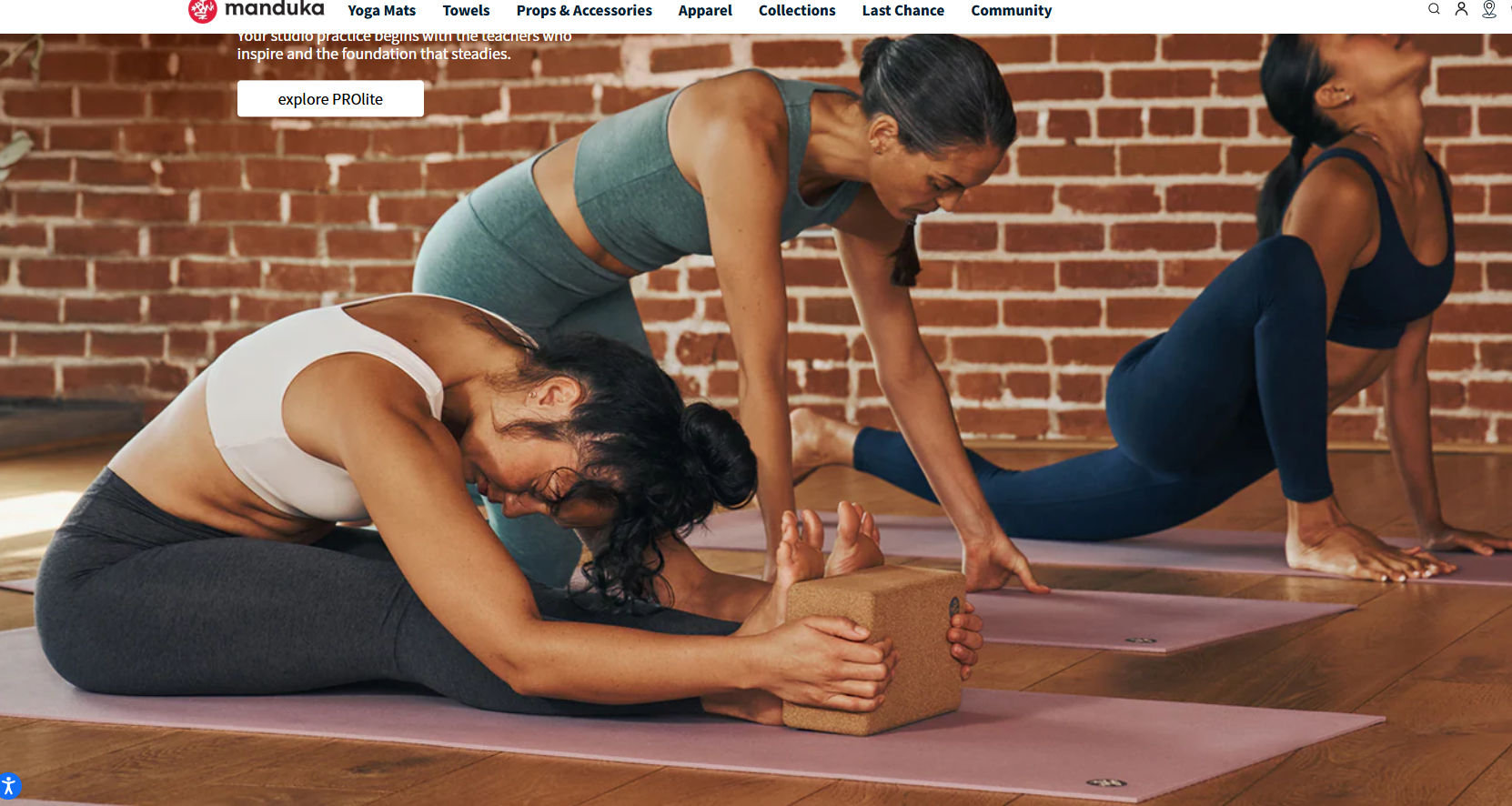
Performance characteristics:
-
Exceptional grip technology: Proprietary surface provides traction without stickiness
-
Lifetime guarantee: PRO series mats include lifetime warranties, even for commercial use
-
Dense cushioning: 5mm and 6mm options protect joints without sacrificing stability
-
Break-in period: Surfaces improve with use rather than wearing down
-
Professional aesthetics: Clean design elevates studio appearance
Wholesale investment:
Manduka wholesale pricing ranges $35-65 per mat for PRO series. BEGIN series offers entry points around $20-30 per mat. Minimum orders start at 25-50 units.
The cost-per-use math favors Manduka despite high upfront costs. A $50 wholesale mat lasting 4 years in studio use costs $12.50 per year. A $20 mat replaced each year costs that same $20—plus the hassle of constant reordering.
Target wholesale buyers:
Premium Pilates studios where mat quality reflects brand positioning. Instructor training facilities needing professional-grade equipment. Corporate wellness programs with serious budgets for employee experiences.
Potential drawbacks:
-
Big initial capital requirement for new studios
-
Break-in period means new mats don’t perform best right away
-
Limited color customization for bulk orders
Lululemon – High-End Options With Distribution Network Advantages
Lululemon goes beyond retail into B2B wholesale for qualified fitness facilities. Their program focuses on brand alignment.

Wholesale program highlights:
-
Design-forward aesthetics: Stylish patterns and colors appeal to design-conscious studios
-
Reversible options: Dual-surface mats provide texture variety
-
Brand cachet: Lululemon association lifts studio perception among target demographics
-
Integrated marketing: Co-marketing opportunities available for select wholesale partners
-
Distribution efficiency: Logistics network ensures reliable delivery schedules
Pricing framework:
Wholesale costs range $30-55 per mat. The brand premium adds 15-25% versus similar performance specs from other suppliers. You’re paying in part for the name recognition.
Best applications:
High-end boutique studios in urban markets. Facilities targeting wealthy client demographics. Studios in areas with strong Lululemon retail presence. Businesses wanting alignment with aspirational lifestyle brands.
Limitations to consider:
-
Selective wholesale approval process (not all applicants qualify)
-
Higher minimums (often 50-100 units for initial orders)
-
Premium pricing without equal performance advantages over competitors
-
Limited Pilates options compared to yoga-focused designs
Jade Yoga – Eco-Friendly Commitment With Tree-Planting Initiatives
Jade Yoga built their reputation on environmental care combined with performance. Their wholesale program goes beyond product sales.
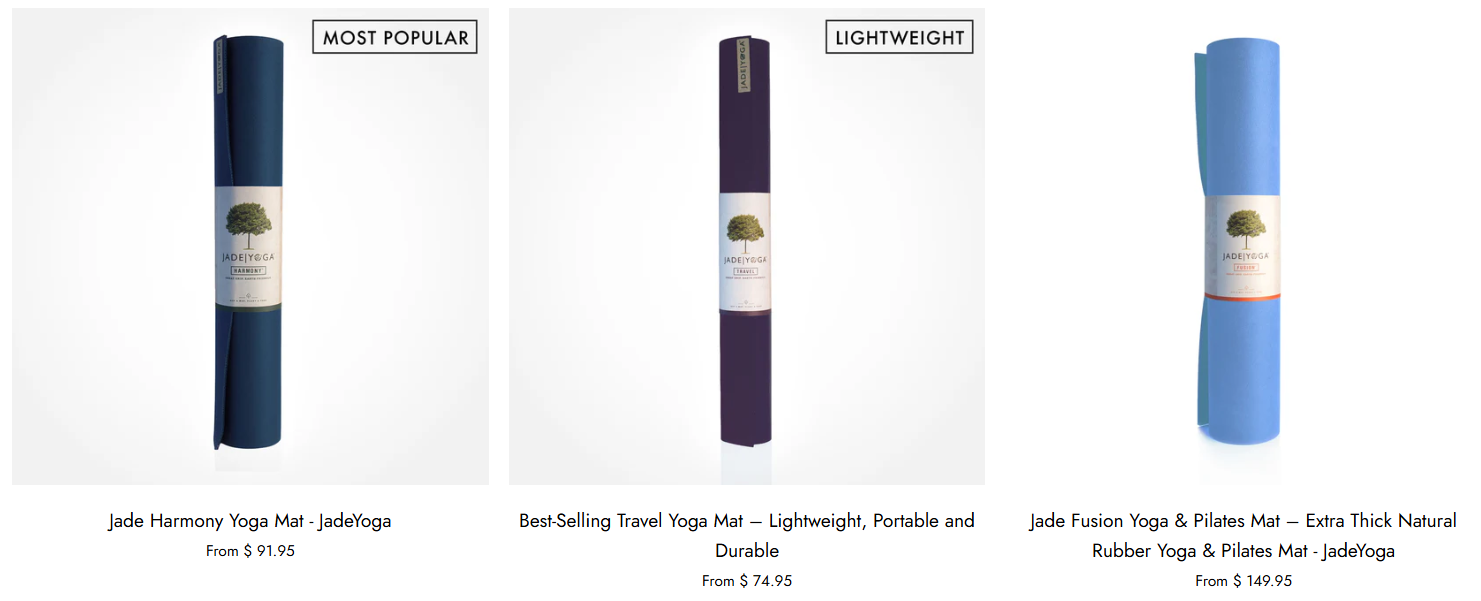
Sustainability features:
-
Natural rubber tapping: Materials sourced from sustainable rubber plantations
-
Tree-planting program: One tree planted for every mat sold (including wholesale purchases)
-
No PVC or synthetic rubbers: All-natural construction appeals to eco-conscious markets
-
Made in USA: Domestic manufacturing in Indiana reduces shipping environmental impact
-
Recycling program: Take-back initiative for end-of-life mats
Performance characteristics:
Superior grip: Natural rubber provides excellent traction in various conditions
Open-cell surface: Absorbs moisture for improved wet grip (requires more cleaning attention)
Thickness options: 3/16″ (5mm) to 1/4″ (6mm) suits different Pilates needs
Durability: Natural materials hold up through years of commercial use
Wholesale pricing:
Jade’s wholesale costs range $25-40 per mat based on thickness and volume. Mid-range positioning balances quality and affordability. Minimum orders start around 20-30 units.
Target customers:
Studios making environmental values central to brand identity. Facilities in eco-conscious markets (Pacific Northwest, Boulder, Austin, Portland). Businesses wanting concrete sustainability metrics to share with clients. Teacher training programs focusing on holistic wellness philosophy.
Practical considerations:
-
Open-cell construction requires more frequent deep cleaning than closed-cell alternatives
-
Natural rubber smell noticeable when new (goes away within 1-2 weeks)
-
Latex sensitivity screening recommended before facility-wide use
-
Heavier than synthetic options (shipping costs a bit higher)
The tree-planting marketing advantage:
Jade’s environmental program provides real talking points. Tell clients: “Your practice here has planted 500 trees this year.” This concrete impact resonates more than vague sustainability claims. It builds community engagement and sets your studio apart.
Comparing U.S. vs. Overseas Manufacturers
Where your wholesale yoga mats come from shapes your business economics, quality control, and how complex your operations will be. The choice between domestic U.S. manufacturers and overseas suppliers goes beyond price. It affects lead times, customization options, quality consistency, and total cost of ownership.
I’ve worked with both U.S. and international suppliers. Each approach offers distinct advantages. Your best choice depends on business size, available capital, customization needs, and what matters most in your operations.
Cost Comparison: Understanding the Real Price Differences
The price gap between U.S. and overseas manufacturers is substantial. But it’s not as simple as it appears.
U.S. Manufacturer Wholesale Pricing:
American manufacturers charge:
– Basic TPE mats: $20-35 per unit
– Natural rubber mats: $30-50 per unit
– Premium PU/cork mats: $40-65 per unit
These prices reflect:
– Higher labor costs in domestic production
– Stricter environmental regulations that increase manufacturing expenses
– Smaller production runs versus overseas factories
– Premium positioning and brand development costs
Overseas Manufacturer Wholesale Pricing:
Direct sourcing from Asia (China, Vietnam, Taiwan) offers:
– Basic TPE mats: $3-5per unit
– Natural rubber mats: $8-12 per unit
– Premium PU/cork mats: $10-18 per unit
Customization Capabilities: Branding and Design Flexibility
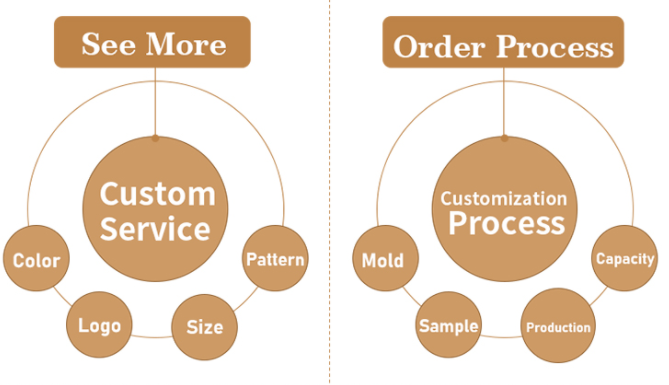
Customization options differ a lot between U.S. and overseas manufacturers. This impacts your ability to create branded products or unique market positioning.
U.S. Manufacturer Customization:
American suppliers offer:
-
Logo printing: Screen printing or heat transfer on existing mat designs
-
Limited color options: Selection from standard color palettes (often 5-12 choices)
-
Minimum quantities: 25-100 units for basic logo printing
-
Setup fees: $200-500 for logo printing plates
-
Lead time addition: 2-3 weeks beyond standard production
Customization depth remains limited. You’re adding your branding to their existing product designs. Full custom specifications (unique materials, dimensions, construction) are rare from U.S. distributors.
Exceptions exist: Some American manufacturers offer deeper customization for very large orders (500+ units). But this isn’t their primary business model.
Overseas Manufacturer Customization:
International OEM/ODM suppliers provide extensive customization:
Design flexibility:
– Custom dimensions: Any length, width, thickness combination
– Material selection: Choose base materials, top layers, bottom grips on their own
– Color matching: Pantone matching for exact brand colors
– Multi-layer construction: Specify different materials for cushioning versus surface layers
– Texture patterns: Custom surface patterns for grip and aesthetics
– Unique features: Alignment lines, zone markings, embedded logos
Branding options:
– Screen printing with multiple colors
– Sublimation printing for photographic images
– Embossing and debossing
– Laser engraving on natural materials
– Custom hang tags and packaging
– Private label development with your brand alone
Minimum quantities for customization:
– Basic logo printing: 100-200 units
– Custom colors: 200-500 units
– Full custom specifications: 500-1,000 units
– Complex multi-color designs: 1,000+ units
Lead Time and Inventory Planning: Operational Implications
Production and delivery timelines create different operational requirements for U.S. versus overseas sourcing.
U.S. Manufacturer Lead Times:
Domestic suppliers offer predictable, fast fulfillment:
Stock products:
– Order processing: 1-2 business days
– Production/picking: 1-3 days
– Shipping: 3-7 days ground freight
– Total timeline: 5-12 days from order to delivery
Custom logo printing:
– Design approval: 2-3 days
– Production setup: 3-5 days
– Manufacturing: 5-7 days
– Shipping: 3-7 days
– Total timeline: 2-3 weeks
Overseas Manufacturer Lead Times:
International sourcing requires extended planning:
Standard production timeline:
– Order confirmation: 1-3 days
– Production queue: 5-10 days (waiting for production slot)
– Manufacturing: 15-25 days (depends on customization complexity)
– Quality inspection: 2-4 days
– International shipping: 20-35 days ocean freight (or 5-7 days air freight)
– Customs clearance: 2-5 days
– Domestic delivery: 3-7 days
– Total timeline: 7-12 weeks standard ocean freight
– Or 4-6 weeks with air freight premium
Timeline variables:
Several factors extend or shorten international timelines:
Factors increasing timeline:
– Complex customization (add 1-2 weeks)
– Revisions to samples (add 1-3 weeks per revision)
– Chinese New Year period (add 3-4 weeks, late Jan-Feb)
– Peak shipping seasons (add 1-2 weeks, Aug-Oct)
– Port congestion (variable, can add days to weeks)
Factors that can reduce timeline:
– Existing molds/designs (save 1-2 weeks)
– Air freight upgrade (save 2-3 weeks, costs 300-500% more)
– In-stock materials (save 3-5 days)
– Established supplier relationship (prioritized production)
Conclusion: Elevate Your Pilates Studio With Quality Wholesale Mats
Your mat selection shapes every aspect of your Pilates business. Client safety depends on it. Satisfaction grows from it. Your studio reputation builds on these foundation elements. Quality wholesale yoga mats pay returns far beyond the initial purchase price.
I’ve walked you through the complete wholesale mat buying process. You now understand the technical specs that matter for Pilates practice. You know how to evaluate suppliers and manufacturers. You recognize the cost differences between sourcing approaches. Most of all, you can make informed decisions aligned with your business model and values.

